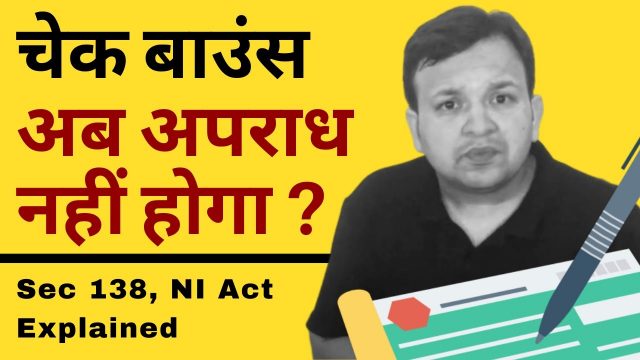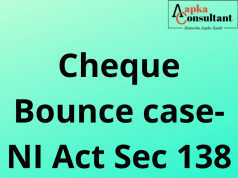Cheque Bounce means when the drawee presents the cheque in the bank and the cheque gets rejected. There can be several reasons behind the rejection of a particular cheque. When we hear the term cheque bounce, several questions come to our mind. For example, is a cheque bounce a criminal offense? Do we have to pay a fee for filing cheque bounce cases from now onwards? Want to know about the new cheque bounce scheme. Want to know more about laws related to cheque bounce of the Government of India. In this article, we will discuss all the aspects relating to cheque bounces in India.
Now onwards, there will be no punishment if the cheque bounces. Because the Government of India is ending the cheque bounce cases under the NI Act(Negotiable Instrument Act 1881). Recently, the Government of India has issued a proposal. They floated a scheme. And they have asked the people for their opinion. That is whether the cheque bounce cases should be decriminalized or let it be a criminal offense. It is a criminal offense under Section 138 of the NI Act. Should those cases be closed which are under section 138? Although, the Government has just asked people for their opinion. No action taken yet. But, the debate has started in the country.
- Is cheque bounce a criminal offence?
Yes. Cheque Bounce is a criminal offense. It is punishable under section 138 of the Negotiable Instruments Act 1881. Punishable with a fine that can extend up to twice the amount of the cheque. There is also a provision of imprisonment of 2 years or both.
- Do we have to pay a fee for filing cheque bounce cases?
If you file a criminal case, then there is no provision of a fee. But, if you file a civil suit against the other party then you have to pay a nominal fee to the Government.
- Let’s first discuss what section 138 of the NI Act says: If you have given a cheque to anyone, and that cheque got bounced. You will receive a notice within 30 days. And you have to revert to that notice within the next 15 days. If you don’t reply in the given period, within 1 month. Then, the complainant or the victim can file a case against you in his respective NI court. If it is proved in the court that the cheque is bounced. Then, there is a provision of 2 years of imprisonment. The court can also order to pay twice the amount which was written in the cheque as compensation.
Reasons for Cheque Bounce
- Insufficient balance: The amount in your bank is not sufficient for the payment.
- Account closed: You have closed your account from the bank.
- No cheque to be cleared: You have directed your bank to not clear any cheque.
- Expired validity of cheque: As the drawee issues the cheque it must be presented within 3 months. Afterwards, the cheque will expire and the expired cheque if presented in a bank will bounce.
- Overwriting: If the signature of the drawer or the amount or any other thing is overwritten then, the cheque will bounce of overwriting.
- Damaged cheque: If the cheque is damaged or there is any mark or stain on the cheque, then the cheque will bounce.
- Signature mismatch: If the signature of the drawer mismatches with the one in the bank or it is absent in that case the cheque will bounce.
- Mismatch in the amount: If in cheque the amount written in the figures and words differ, in that case, the cheque will bounce.
This act was created for those bonafide sellers who are genuinely selling you the stuff. And if you default in payment then, his rights can be protected. Many amendments came from time to time in this section. For example, the trial should be completed in 6 months, there should be a day-to-day trial, questions were asked regarding the jurisdiction of the cases. The Government of India has tried so many times that the seller in the cheque bounce cases whose payment got defaulted can get positive credibility. And can also get his payment in time.
But this new scheme has raised a lot of questions. In every individual’s mind and we are compelled to rethink if the Government is going to decriminalize it. If it happens then, will people get their payment on time?
- There are two ways for recovery
- By filing a criminal case
- Asking for recovery in civil court
The cases in civil court are time taking. It is a tedious process that takes years for recovery sometimes up to 5 to 10 years. Also, when you file a suit in Civil Court you have to pay a certain amount as stamp duty. This stamp duty is the court fee. In the NI Act, you do not have to pay any fee.
Now time will tell whether the government will implement this scheme or the law will remain the same. Hope you got all the details regarding the subject.
Still, have any legal doubt, contact the Legal Experts of AapkaConsultant.com
(अपनी क़ानूनी समस्या को 1 कॉल पर अभी सॉल्व करे )












